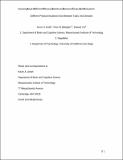Different Physical Intuitions Exist Between Tasks, Not Domains
Author(s)
Smith, Kevin A; Battaglia, Peter W; Vul, Edward
Download42113_2018_7_ReferencePDF.pdf (1.302Mb)
Publisher Policy
Publisher Policy
Article is made available in accordance with the publisher's policy and may be subject to US copyright law. Please refer to the publisher's site for terms of use.
Terms of use
Metadata
Show full item recordAbstract
Abstract
Does human behavior exploit deep and accurate knowledge about how the world works, or does it rely on shallow and often inaccurate heuristics? This fundamental question is rooted in a classic dichotomy in psychology: human intuitions about even simple scenarios can be poor, yet their behaviors can exceed the capabilities of even the most advanced machines. One domain where such a dichotomy has classically been demonstrated is intuitive physics. Here we demonstrate that this dichotomy is rooted in how physical knowledge is measured: extrapolation of ballistic motion is idiosyncratic and erroneous when people draw the trajectories but consistent with accurate physical inferences under uncertainty when people use the same trajectories to catch a ball or release it to hit a target. Our results suggest that the contrast between rich and calibrated versus poor and inaccurate patterns of physical reasoning exists as a result of using different systems of knowledge across tasks, rather than being driven solely by a universal system of knowledge that is inconsistent across physical principles.
Date issued
2018-07-09Department
Massachusetts Institute of Technology. Department of Brain and Cognitive SciencesPublisher
Springer International Publishing